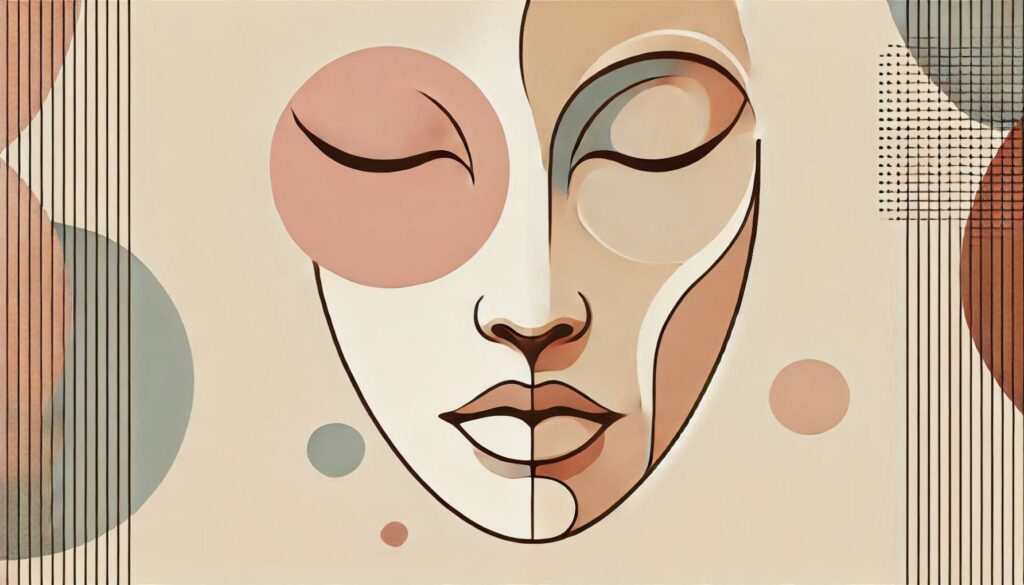Why do I believe in mindful dating? Why is practicing vulnerability in dating essential for forming true connections?
It comes down to that popular buzzword “authenticity.” When computers create content on command and images can be faked, you can wonder what’s real. For instance, are flawless dating profiles genuine, or just an act?
The real tends to be more appealing, like when a dating app message goes beyond “hello,” or when a potential partner listens instead of nodding along (or nodding off). Beyond the botox and touch-ups, we can prize people who show up with wrinkles, baggage, or a few extra pounds because they’re brave enough to be real.
Why I Believe in Mindful Dating and Vulnerability in Dating (and Created This Site)
- After dating a narcissistic man, I grew to dislike people who present a false front. (Not everyone meets the exact definition of Narcissistic Personality Disorder per the American Psychiatric Association’s Diagnostic and Statistical Manual of Mental Disorders (DSM). But some people come close).
Narcissists hide their true selves; despite what they say, their actions tell us who they truly are.
My ex was charming and attentive when I was with him (to meet his need for fulfillment), but ignored me when we were apart. Early in that relationship, I wasn’t fully open about my goals or values. I settled for a match in rather than outside of the bedroom.
- I considered sharing my story to help others who struggle to recover from narcissistic relationships. An acquaintance suggested narcissism is a common topic and that I focus instead on helping others reconnect with their authentic selves. He explained that when we’re in unhealthy relationships, we literally lose ourselves. When we receive love that feeds us, we reconnect with who we are.
- A therapist I saw when I was trying to leave the relationship noticed when I discussed problems with others, I treated them as if they were “fragile.” I didn’t want to hurt their feelings, so I often avoided confrontation or softened my words to the point of losing my voice.

For example, if I was speaking with a chatty Cathy, I’d cut the conversation short rather than saying, “Could we take a break?” But I risked upsetting the other person or damaging the relationship. I realized I couldn’t control how others react; yet, in speaking up when something bothered me, I was honoring myself. Instead, I aimed to be assertive, to lift everyone up without tearing anyone down.
- When I was around people I didn’t know well, I tended to present my agreeable side — the one who nodded along and ignored criticism. It attracted “cling ons” who fed off my attention in one-sided relationships.
- When I’m the same person at home as I am in public — not nervously fueling a facade — I feel more secure in who I am. The interactions flow more naturally.
Essentially, I’m taking a risk. As someone who’s been private most of my life, putting myself “out there,” being vulnerable, sometimes feels awkward because what will they think? As a shy girl, that fear was paralyzing.
But I gradually grew past that and this isn’t a reality TV show. I’m not filming myself on dates or in daily life. I’m just sharing what works and what doesn’t work and what I’m learning along the way. Failure is a possibility, and “the one” for me might turn out to be me. (Learning to love myself seems to be a life lesson.) And that’s OK. Even if my efforts end up in vain, I hope we can both learn from my journey.
Refining My Authentic Dating Philosophy and Exploring it Intellectually
In his book Becoming a Person, psychologist Carl Rogers noticed that pretending to be someone he wasn’t led to shallow connections. When he accepted his imperfections and expressed his true feelings (like some cognitive behavioral therapy teachings), his interactions became more genuine. Through his client work, Rogers realized that what feels most personal often resonates deeply with others, creating intimacy. He hypothesized that this approach could help everyone.

A 2019 study defines authenticity in relationships as (1) being willing to risk being open emotionally, and (2) being honest, even when it might hurt. Based on self-reported data (mainly from college students under 22), the study found that authentic people are more likely to “be themselves” when they seek or maintain serious relationships and are generally preferred over game players.
But the results relied on self-assessments — rather than real-life interactions — and focused on a younger demographic, which doesn’t show if these patterns last into older adulthood.
These findings resonate with me and outside of my experiences, form the basis for my beliefs.
My Vulnerability in Dating Philosophy
Authenticity in dating is about stepping into the light as you are, even if it casts some shadows. If you’re insecure about being single, it can sting. It can be tempting to present a polished version of yourself to please others or fit in. But that approach can lead to situationships that sap your time and energy.
A true match will stay even when you show them your true self. You don’t need to fill the space beside you at any cost. Instead, make room for the right connection or enjoy your own company until they arrive.
Check your status on the road to authentic love: take the Am I Dating in Disguise? Test.
What Being Vulnerable in Dating Means (and What It Doesn’t Mean)
The advice to “be yourself” can be unclear; some see it as letting loose as if no one’s watching — saying every thought without a “tactfulness” filter. To others, it’s showing a socially acceptable version of yourself (an ideal self).
Some prefer the phrase “be honest.” Honesty, being yourself, or whatever you call it comes with risks — like the chance someone won’t like you. But how far do you go? Authentic dating doesn’t necessarily mean showing every flaw, bias, or even poor hygiene. Many of us dislike being around people who stink due to uncleanliness or bad vibes.

Life isn’t perfect. If a loud burp or fart sneaks out when you’re on a date, how do you handle it? Do you laugh it off, apologize, excuse yourself, or pretend it didn’t happen? For the ladies, such acts aren’t on Cosmopolitan’s 10 Legit First Date Tips From Guys You’ll Want to Remember. But the broad term “be open” is. 🙂
The right person will care less about your slip-ups and more about how you own them. Because in loving, authentic relationships, the partners speak openly. In his book Wired for Love, psychotherapist Stan Tatkin said he found that “partners who fear—how to do I say this delicately?—going to the bathroom in front of each other also fear telling each other everything. I haven’t done any hard research on this; it’s simply anecdotal evidence.”
Vulnerability in dating can mean you show yourself in your best light, but don’t necessarily hide your flaws. On a first date, if you’ve got the steel to show your true self, you open the door to a match who accepts you as you are — burps and all.
What Mindful Dating Requires
Authenticity starts with knowing yourself. For example, if you value people who listen to you and haven’t explored why, you might not know it began when your parents didn’t listen to you when you were a child.
Signs you’re not practicing authentic dating:
- You must remind yourself to be yourself.
- You filter your thoughts and feelings so much before you react that the moment to be real has passed (some filtering is normal).
Ask yourself these questions to explore your authenticity:
- When do I feel most like myself?
- How do I act, speak, and feel when I feel most like myself?
- What has stopped me from being myself before?
- After a date, do I feel like I showed up as myself?
- What’s one small way I can show up authentically and practice mindful dating the next time? (Hint: Take the “Am I Dating in Disguise?” Test to see where you stand!)
Authentic dating takes courage: to know who you are, to be open to real connections, and trust the right match will arrive when you’re ready. Begin the process through asking questions to discover your true self — stop acting and start being.
- Why Do We Love the Way We Do? - March 14, 2025
- 5 Reasons I Believe in Mindful Dating and Why You Should Embrace Vulnerability, Too - January 19, 2025
- Single and Lonely No More: 7 Steps to Happiness and Fulfillment - November 1, 2024